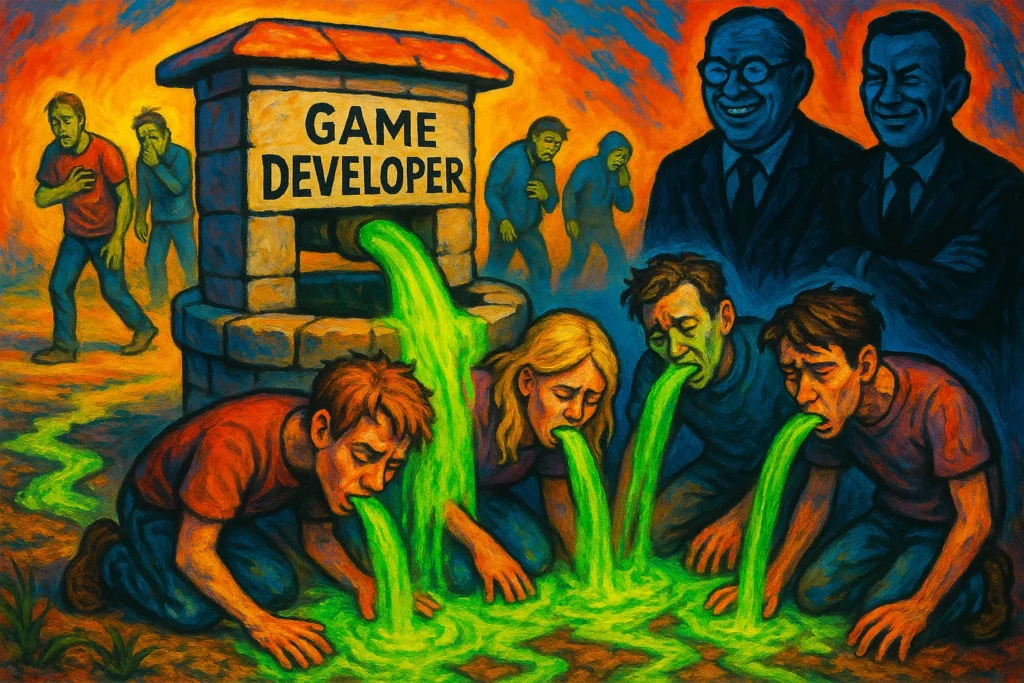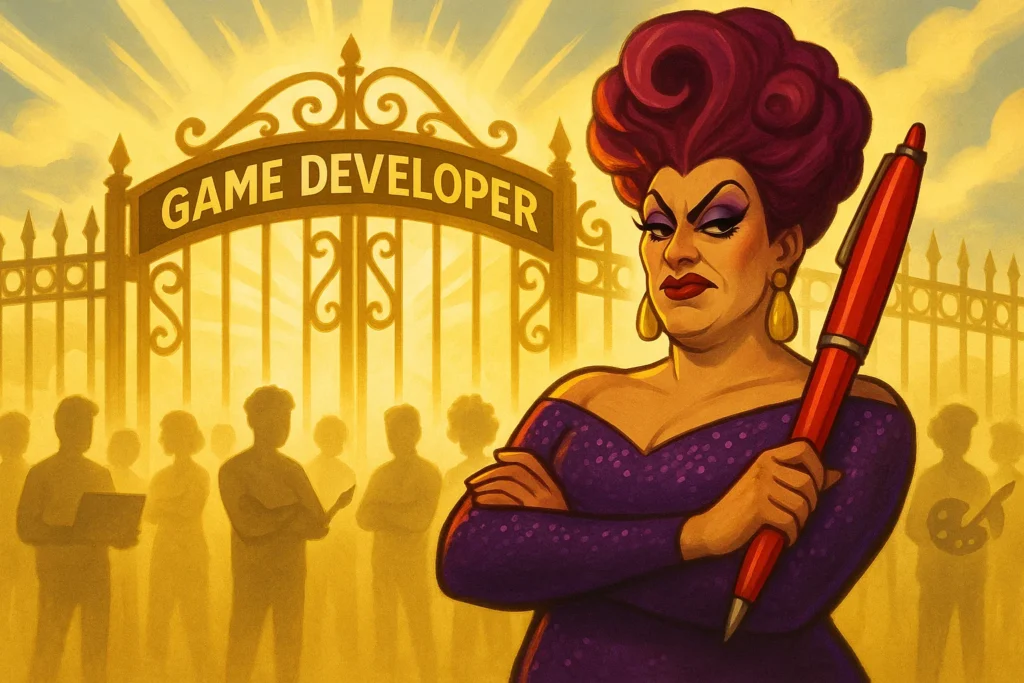To understand the managerial capture of the video game industry, study one of its gatekeepers: Bryant Francis, Senior Editor at Game Developer (formerly Gamasutra). His career is not a résumé so much as a confession. It is proof that influence in games media now flows less from craft and shipped work than from ideological utility.
The Credentials Gap: A Critic Installed Above Creators
A glance at Bryant Francis’s official Game Developer author page shows the title “Senior Editor” and a decade of writing about game development. What’s missing is the point: no shipped game credits across the industry’s core disciplines—no systems, no code, no art, no design leadership. He presents one creative credit: “writer and narrative designer” on the indie strategy title Zephon.
The transcript of his recent YouTube interview reinforces this origin story. He didn’t chart a builder’s path; he “stumbled into” games after film school by winning a jokey writing contest at PAX. That was the door. The industry did not promote a maker; it elevated a commentator.
In a field where real developers burn weekends on crunch, tools, pipelines, and bug purgatory, a man with one narrative assist now edits the trade’s flagship outlet and pronounces on “what’s good for games.” That’s the capture, in miniature.
The Inquisitor’s Mindset: Politics First, Players Last
Francis does not hide his filter. In his own words, he is “cursed,” his “brain is poisoned,” and he has obsessively tracked right-wing politics “since high school.” He volunteers that this shapes his stories. He cites Anita Sarkeesian as formative. None of this is neutral; it is a declared priors deck.

This is not the craft language of pacing, encounter design, or affordances. It is the catechism of moral battle. When players object to clumsy, box-ticking insertions, he reflexively reads the dispute as “far right” pathology. He talks about criticism as “taste” and “slop,” the posture of a hall monitor of culture, not a servant of the audience who asks the only question that matters: is it fun?
The Sweet Baby Inc. Defense: Guarding the Consultant Class
When Sweet Baby Inc. became the focus of widespread player criticism, Francis’s instinct was not to interrogate the consultancies that insert politicized story beats, but to pressure platforms to police the critics. He framed pushback as “harassment,” urged moderation crackdowns, and cast the player base as a problem to be managed. Media commissars protect the narrative engineers; the consultants poison the well; the press guards the poison.
“Deprofessionalization” Panic: A Gatekeeper’s Fear Laid Bare
In his article “Deprofessionalization is bad for video games,” Francis lamented the rise of small teams and the stumbles of AAA. He branded the healthy decentralization that lets a three-person shop out-create a boardroom as a threat. That is projection. The only “profession” endangered by the indie renaissance is the profession of gatekeeping—credentialed commentary installed above builders.
The transcript from the YouTube video strengthens this read. He admits his path succeeded by luck and timing, then warns aspirants that the field is contracting and grim. Translation: the factory is failing, and the cottage is thriving. His solution is to re-elevate the factory and its chaperones.
The ESG Cog: Ideology Over Joy
No one needed a memo to see how the Social pillar of ESG seeps into editorial framing: celebrate consultants and quotas, pathologize dissent, and shame platforms into suppressing disfavored players. Francis’s own descriptions—politics as operating system, journalism as moral sorting, admiration for Sarkeesian’s template—fit that machinery. You don’t have to shout “ESG” to run the playbook; you just have to keep treating political compliance as the telos of game development while treating player enjoyment as negotiable.

Exhibit A: His Words, Not Ours
From the transcript (Episode 114, Red Tunic Podcast):
- On how he got here: he “stumbled into” games after film school via a jokey PAX writing contest.
- On his mindset: he is “cursed,” his “brain is poisoned,” and he has tracked the far right “since high school,” which “shapes [his] stories.”
- On role and credits: he identifies as “writer and narrative designer” on Zephon while serving as “senior editor at Game Developer.”
No spin needed. Taken together, this is the profile of an inquisitor with a press badge: minimal shipped craft, maximal ideological frame, maximal leverage over the conversation.
What This Says About the System
Francis is not an outlier. He is a type—an apparatchik of narrative enforcement rewarded not for building joy, but for policing it. Installed above the makers, he treats players as a herd to be vaccinated against wrongthink and developers as vessels for policy goals. He is useful to a system that prefers compliant narratives to loud fun.
The Poisoned Well: A Legacy of Corrupting the Craft
Bryant Francis’s most damaging role is as the current chief poisoner of the well for aspiring game developers. From his sanctioned perch at Game Developer, he is not an outlier; he is the inheritor and amplifier of a toxic legacy pioneered by his predecessor, Brandon Sheffield.

Sheffield, as detailed in these pages, used his platform at Gamasutra to shift the conversation from craft to ideology, championing progressive activism over design excellence. Francis has not only continued this project but has intensified it, ensuring the institution now actively misguides the next generation by teaching them to prioritize the wrong values.
Aspiring developers seeking guidance are now subjected to a corrupting curriculum:
- Ideology Over Craft: Following Sheffield’s blueprint, Francis teaches that a narrative’s primary goal is to be “inclusive” and “sensitive,” not compelling, coherent, or fun. He champions box-ticking consultants over master world-builders. The lesson internalized is that political compliance is more valuable than player engagement.
- Victimhood Over Agency: This legacy frames the industry as a hostile place where developers are perpetually victimized by “harassment” from players. This fosters a mindset of paranoia, teaching newcomers to see their audience as an adversary to be censored, not a community to be delighted.
- Careerism Over Creation: Their combined paths—Sheffield and Francis ascending through activism and meta-commentary, not shipped games—present a dangerous blueprint. It signals that influence is won by mastering dogma, not mastering the craft. This incentivizes the wrong ambition: becoming a commentator, a consultant, an HR manager—anything but a builder of great games.
The damage is a multiplied legacy. It is the creation of a generation of developers obsessed with narrative questionnaires and diversity dashboards, who learn the jargon of grievance politics to advance their careers instead of the principles of design to captivate players.
Francis and Sheffield are not just bad actors; they are bad teachers. They have systematically corrupted the artistic and professional standards of the industry from within one of its most influential institutions. The long-term cost is measured in bad games, built by developers who were taught to care more about placating commissars than pleasing players.
The Editor-In-Chief: The Ideological Source
The capture of Game Developer is directed from the top. Bryant Francis’s openly queer superior, Editor-in-Chief Danielle Riendeau, is the architect of the publication’s ideological mission. Her resume is a map of the progressive media establishment—VICE, Polygon, Fanbyte—but her personal and professional journey reveals a far deeper commitment.
Riendeau’s extensive writing on queer theory, including a Vice article articulating a philosophy of art based on “queer intention,” are not personal footnotes; they are foundational to her editorial worldview. She embodies the core belief that identity is the primary lens through which art must be critiqued—that the “intention” and identity of the creator often supersede traditional metrics of quality, craft, or broad audience appeal.

This is the editorial blueprint she has imposed. It explains Game Developer’s relentless focus on identity politics over technical execution and moral posturing over player satisfaction. For Riendeau, games are not just entertainment; they are vehicles for a moral and social project, and she has positioned her publication as its chief promoter. Her mention of being a “hobbyist game developer” is a telling attempt to graft on credibility, inadvertently highlighting the core crisis: the gatekeepers of this creative industry are amateurs in the craft, whose real expertise is in enforcing a specific ideological conformity.
The Corporate Calculation: A Strategic Appointment
Danielle Riendeau did not accidentally become Editor-in-Chief. Her appointment was a deliberate corporate strategy. A senior executive at Informa PLC undoubtedly reviewed her resume—a history of progressive activism at VICE, Polygon, and Fanbyte, with no substantive game development experience—and saw the perfect candidate.
They were not hiring for expertise in game design; they were hiring for ideological reliability. Her background guaranteed that Game Developer would become a loyal instrument for three corporate goals:
- ESG Compliance: Generating content that aligns with the Social metrics demanded by institutional investors.
- GDC Synergy: Reinforcing the conference’s shift toward ESG and DEI messaging, making the publication a promotional arm for Informa’s most profitable event.
- Risk Mitigation: Ensuring the outlet would never challenge the prevailing DEI orthodoxy or criticize the corporate strategies of Informa’s partners.
Riendeau and Francis are not renegades. They are on-message employees, performing exactly the function for which they were hired. The rebellion is a carefully managed brand. The political agenda is a profitable corporate product.
Conclusion: The Useful Idiot of the ESG Regime
Bryant Francis’s own record—his hollow author page, his “deprofessionalization” panic, and his self-damning interview confessions—renders the verdict inescapable. He is not a creator, not a craftsman, not even a critic in the classical sense. He is the perfect useful idiot for the ESG regime that bankrolls the modern industry.
He plays his part not through malice, but through blind conviction. He truly believes he is safeguarding the medium, never grasping that he is a disposable pawn in a much larger financial machine. His function is simple: provide the ideological cover—the glowing profiles, the moral lectures, the censorship pleas—that allow corporate publishers to chase ESG scores, curry investor favor, and trade cultural vitality for capital.
He is useful because he is certain of his own righteousness. He is idiotic because he cannot see that the system he serves will discard him the moment his utility expires.
The gatekeeper is not a game maker. He is a tool—an obedient chaperone of mediocrity.
Support the studios that ship, the indies that innovate, and the players who reward joy with their wallets. Reject the stooges, the hall monitors, and the ideological parasites. The soul of gaming belongs to the builders, not to the well-funded interlopers who stumble in, crown themselves arbiters, and fasten the lid on the coffin of creativity.
— Wolfshead
Related Videos
Related Quote






Interesting that he is capable of self-reflection about his qualifications or lack thereof. But apparently he is willing and useful tool enough.
The question is, WHO put him and Danielle R. and similar people intentionally into such positions to shape the narrative. They are just tools indeed.
The About Us lists only the tools. Parent Informa TechTarget is a marketing company, there I stopped my investigation for now.
The Left Hand of Darkness at work. Oh my.
This is the big question: who at Informa PLC put him and others in charge? I could have easily doubled the size of the article going deeper into the rabbit hole.
This kind of ideological infiltration is happening throughout the world in Hollywood, Nashville, etc. It’s all part of a globalist plot to control the narrative.
Serious game designers will never waste their time reading Game Developer. I can tell you that with 100% certainty. Putting Bryant and Riendeau in charge of GD makes as much sense as putting Dracula in charge of the blood bank. They have zero professional and moral authority to be in the roles they have. They are commissars and nothing more.
Game Developer and GDC are rotten to the core.
They are useful idiots. They believe this narrative is their life’s work, while they fail to realize that this is why they are useful to the 1% who want to create this strife and segregation among the masses so they are easier to control and can’t unite against the 1%.
The 1% want this moral degradation to spread everywhere and as many minds to be polluted by it. So now the next generation of kids are their prime target, by the time they turn 18 they will be full fledged wokesters, who’ve changed their genders and even been animals multiple times too.
And such people who are too short-sighted to realize they are being manipulated into thinking they are spreading their progressive message around are the perfect tools who self-engineer and self-brainwash themselves into being better useful idiots. They connect and interact with other such as them and brainwash themselves further by the power of affirmation.
Someone on a local news board in my native language joked that it was like this:
– before gays were beater in bathrooms
– then gays became normal and legal
– then gays became celebrated
– now what’s left is to make being straight and normal illegal so you get beaten up by gays
And with the recent events of Charlie Kirk, I can see this happening. Good thing I live in a country where being straight and white is being 95% of the population so at least I hope people can’t get persecuted for that…. for now.